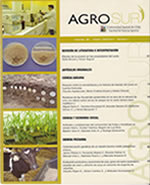Arsenic uptake reduction by vegetables grown in mining-polluted soils: The first ever Chilean study
Main Article Content
Abstract
Leafy vegetables grown on arsenic-polluted soils will absorb it into edible parts. Thus, consumption of such vegetables increases arsenic human exposure. In this study, we compared the effects of different soil amendments on arsenic concentrations in edible tissues of lettuce grown in a soil affected by copper mining activities and evaluated the usefulness of the soluble fraction of arsenic in soil as a predictor of arsenic uptake by lettuce. Lettuce from the plots amended with compost + FeSO4 tended to have lower foliar concentrations of arsenic. These amendments showed no detrimental effects on plant development. Therefore, the application of soil amendments can be considered a viable alternative method to reduce the solubility of arsenic in soil and its concentration in lettuce. The present paper is the first out of Chile to highlight the possibility of reducing arsenic concentrations in vegetable crops. However, more studies are needed to uncover the mechanism of action of the combination of compost + FeSO4 in reducing arsenic uptake by crops.

